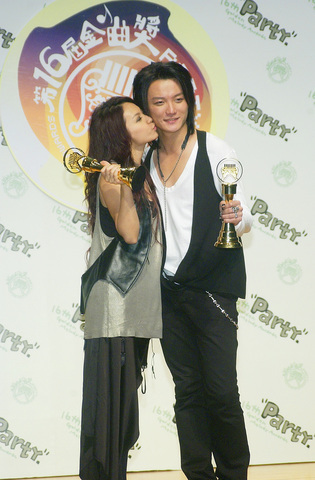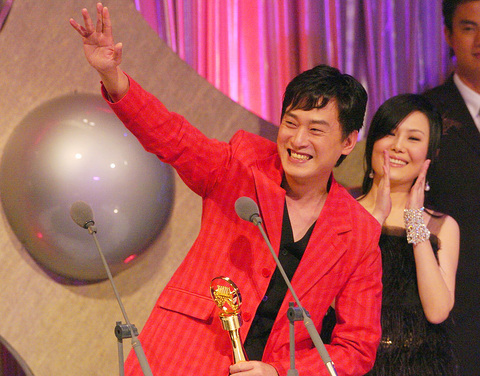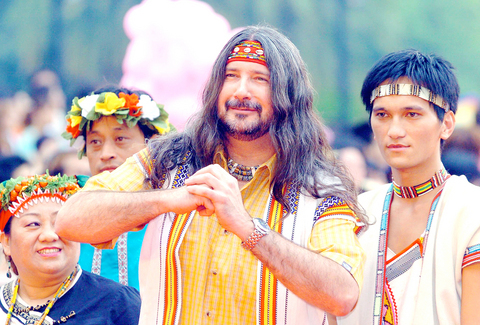A late afternoon thunderstorm interrupted the red-carpet celebrations, but otherwise the 16th Golden Melody Awards took place yesterday without a hitch in Kaohsiung, declaring the year's queens and kings of Chinese-language pop music.
The nominees this year in the popular music categories contained many familiar faces, including Jay Chou (
Following through on their many nominations, Sheng Xiang and Water 3 took one of the evening's first popular music awards, handed to Chung Yung-feng (

Speaking backstage after being handed the award, Chung said, "The fact that I've won this award shows the importance that society now places on the Hakka and other minority groups. This gives me a really great feeling of acceptance." The band later also won the Best Hakka Album Award.
The Golden Melody Awards the Chinese pop music industry's equivalent of the Grammy Awards in the US are held annually to award professionals making music in Mandarin, Taiwanese, Hakka and any of Taiwan's Aboriginal languages. A 36-judge panel is assembled by the Government Information Office, which sponsors the awards.
This year, awards were given in a total of 33 categories, 22 of them in pop music and 11 in classical, tribal, religious and children's music, as well as a special award to honor someone for lifetime achievement in the musical arts. This year's nominees were drawn from 6,208 entrees.

Before the evening's proceedings, thousands of teenagers had braved the intermittent rain showers, crowding the area in front of the city's monumental cultural center to see their favorite stars enter the venue in one of the event's most anticipated rituals. Wang Lee-hom wowed the crowds in a full white get-up decked out with hip-hop-style shiny jewelry and mirror sunglasses.
Most of the grand entrances, however, were of the glamor variety, with men and women alike dressed in classy formal wear. Stanley Huang (
Two of the ceremony's three hostesses Lin Chih-ling (

The third hostess, popular TV show presenter Momoko Tao (
That move broke the ice for a uniquely smooth and upbeat ceremony, despite the continued downward trend of album sales that plagues Taiwan's music industry.
Sales of popular music are down more than 60 percent since hitting a high mark in 1998, leading to a few appeals during the night for people not to buy pirated goods.

In the evening's most sentimental moment, the late comedian Ni Min-jan (
Judy Chiang (
The three-piece pop-rock band F.I.R won the Best Newcomer Award.
Outspoken singer Lotayu (
Winning the Taiwanese Female Singer Award was Sun Shu-mei (
American new-age musician Matthew Lien took an award in the world music category for his album A Journey of Water, which traces metaphorically through music the flow of water from the mountains of Ilan County to the Pacific Ocean.
The alternative songstress Sandee Chen, who had three nominations and on the red carpet dismissed off-hand the notion that she might be nervous about getting an award, received the Best Producer Award. The Aborignal pop rock group Power Station took top honors in the hotly contested Best Duet Group category, beating out the poular group S.H.E and Stanley Huang with Machi.
This year marked the third time that the Golden Melody Awards were held in the southern city of Kaohsiung.

Towering high above Taiwan’s capital city at 508 meters, Taipei 101 dominates the skyline. The earthquake-proof skyscraper of steel and glass has captured the imagination of professional rock climber Alex Honnold for more than a decade. Tomorrow morning, he will climb it in his signature free solo style — without ropes or protective equipment. And Netflix will broadcast it — live. The event’s announcement has drawn both excitement and trepidation, as well as some concerns over the ethical implications of attempting such a high-risk endeavor on live broadcast. Many have questioned Honnold’s desire to continues his free-solo climbs now that he’s a

Lines between cop and criminal get murky in Joe Carnahan’s The Rip, a crime thriller set across one foggy Miami night, starring Matt Damon and Ben Affleck. Damon and Affleck, of course, are so closely associated with Boston — most recently they produced the 2024 heist movie The Instigators there — that a detour to South Florida puts them, a little awkwardly, in an entirely different movie landscape. This is Miami Vice territory or Elmore Leonard Land, not Southie or The Town. In The Rip, they play Miami narcotics officers who come upon a cartel stash house that Lt. Dane Dumars (Damon)

Francis William White, an Englishman who late in the 1860s served as Commissioner of the Imperial Customs Service in Tainan, published the tale of a jaunt he took one winter in 1868: A visit to the interior of south Formosa (1870). White’s journey took him into the mountains, where he mused on the difficult terrain and the ease with which his little group could be ambushed in the crags and dense vegetation. At one point he stays at the house of a local near a stream on the border of indigenous territory: “Their matchlocks, which were kept in excellent order,

Today Taiwanese accept as legitimate government control of many aspects of land use. That legitimacy hides in plain sight the way the system of authoritarian land grabs that favored big firms in the developmentalist era has given way to a government land grab system that favors big developers in the modern democratic era. Articles 142 and 143 of the Republic of China (ROC) Constitution form the basis of that control. They incorporate the thinking of Sun Yat-sen (孫逸仙) in considering the problems of land in China. Article 143 states: “All land within the territory of the Republic of China shall